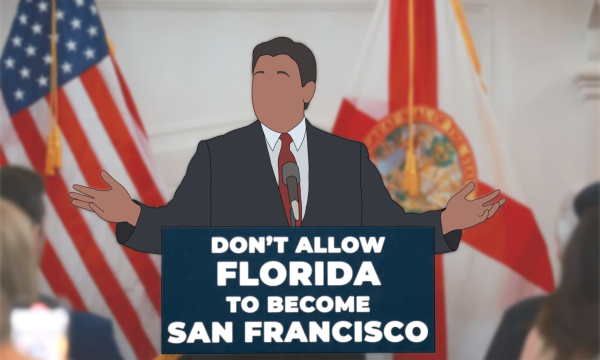Catalan Independence Movement

Catalan nationalist flags flow through the air as those holding them demand their independence.
Oct 16, 2014
Catalonia, an autonomous region in Northeast Spain, has lately been campaigning for its own independence from the Spanish government. Vexed by the restrictions imposed on their autonomy from a 2010 Constitutional Court ruling, thousands of Catalans have taken to the streets to protest the central government’s attempt to “Hispanicize” them. Madrid has responded to their calls with unionistic zeal; after the announcement of an independence referendum by Catalan President Artur Mas, the Spanish government, under Prime Minister Mariano Rajoy, immediately appealed to the Constitutional Court on Sept. 29, 2014, which promptly suspended any Catalan secessionist activities. While secession is clearly illegal, it appears to be the only possible step to protect the Catalans from a regime that is fast becoming oppressive once again.
The modern Catalan chaos began in the 1930s, when prominent political parties in the region, most notably of which being the FAI (Federacion Anarquista Iberica) and the CNT (Confederacion Nacional de Trabajo), supported the Republicans against the fascist General Francisco Franco during the Spanish Civil War. After Franco’s subsequent triumph and ascendance to absolute power, Catalan culture was suppressed for its insubordination until the dictator’s death in 1975. During the reign of Juan Carlos I came a relaxation from the suffocation of Catalonia with the new Spanish Constitution of 1978, which granted the region a high degree of autonomy. However, the Spanish national government has recently begun to infringe on these constitutionally-granted rights once again, and the Catalans are fearing a regression back to the times of cultural suppression.
The implications of Catalan secession are startling and most certainly detrimental to Iberia as a whole. Principally, Barcelona, one of Spain’s biggest cities, will inevitably secede along with the rest of the Catalan province, and consequentially, deepen Spain’s horrific socioeconomic crisis. Unemployment in Spain already resides well over 25%, and the departure of the country’s major financial nucleus would undoubtedly make economic collapse unstoppable.
Secondly, the disaffiliation of Catalonia would incontrovertibly lead to the political fragmentation of Spain. Spanish nationalists, the evident minority, would feel inclined to speak out against the secession, while on the other hand, other autonomous communities (namely those of the Basque County and Navarre) would feel more inclined to part ways with Madrid.
“I definitely think that Catalán Independence will result in civil unrest and protest in the face of an already tense political situation. The youth has already been disillusioned, with all hopes of a better future near nullified, and the elders do not cease complaining. There is still a sense of Spanish unity, but it is hanging on a thread. The politics have approval ratings six feet under and honestly the country has two fates: the resurgence of political extremism, or dissolution,” junior Joseph Villafañé said.
However, Catalan secession would undoubtedly be in the best interest of Catalans. Historically, unified Spain has tended to be bad news for Catalonia, spare the Second Spanish Republic before it fell to the Generalissimo Franco (as egalitarianism is usually included in a traditional communist package, the IR (Izquierda Republicana) implemented many liberal reforms after growing in power in the 1932 elections, which benefited Catalonia). Nonetheless, with a 1/8 chance for an accepting national government, Catalonia is much better off as a separate republic, as is Kosovo, for instance.
With Spanish nationalism on the decline, and the member communities of Spain, most prominent of which being Catalonia, becoming increasingly dissatisfied by the notion of unionism, there is little hope for the age-old marriage of Aragon and Castile. Whether there is a reemergence of Falangist tendencies in the national government or the rapid devolvement of said government to the point of nonexistence has yet to be seen; nevertheless, the entire world will feel its effects, as upheavals in great empires always are.























